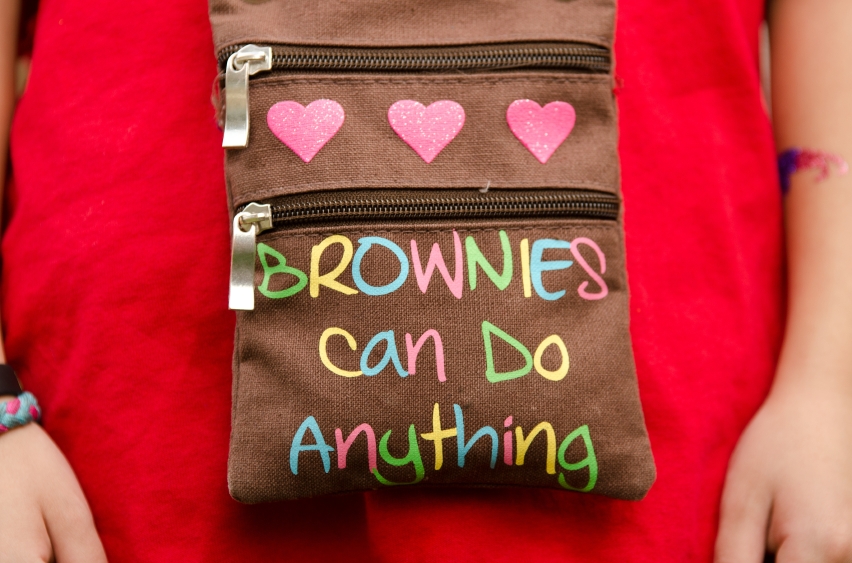Mattel and Girl Scouts of America announced a new $2 million, three-year partnership in March. The topline is pretty simple: girls in a local scout troupe can earn a new Barbie “Be Anything, Do Everything” participation patch to sew on their uniforms.
Sounds great to me. A simple way for an underfunded non-profit to earn some serious coin to keep doing good for America’s girls. So why does this partnership spew controversy?
Actually, there are several good reasons why Barbie becoming a Girl Scout gets folks’ attention.
First, advocates of a commercial-free childhood oppose any kind of financial sponsorship that shoves marketing messages down kids’ throats
The Mattel funding is the Girl Scouts’ first corporate deal, a big departure for the Scouts, which historically has raised money through membership dues and cookie sales. This change messes with a quintessential icon of American girlhood.
Second, some people just don’t like Barbie. She’s got a real passion for fashion and a boobs-waist-hips ratio that is impossible to achieve. No one, not even Kim Kardashian or Jessica Simpson, can really look anything like Barbie.
“Barbie is basically a terrible role model for girls, and she’s not about what the Girl Scouts’ principles are, which have to do with leadership and courage,” Susan Linn, a psychologist and director of the Campaign for a Commercial-Free Childhood.
So ok — people who felt that the wholesome, uniformed, do-gooder Girl Scouts were a nice antidote to Barbie’s shallow plasticity are naturally steamed about the Mattel-GSA marriage. I get this too. I worry terribly about my girls’ self-esteem and eating disorders and I don’t imagine that Barbie’s crazy figure helps with that stuff.
But here’s the dirty little secret. Although it doesn’t make sense that Barbie makes me feel good about myself, she does. I love Barbie. I have four Barbies in my office smiling at me right now. Millions of girls of all ages love Barbie. And I gotta say, Barbie made me feel better about myself than my years in the Girls Scouts learning to sew and sing campfire songs ever did.
And there’s nothing wrong with that.
The problem here runs far deeper, into the heart of why it is so hard to grow up female in America. America itself – not Barbie or the Girl Scouts — sets a terrible (and terribly conflicting) mandate for girls and women. Our culture, starting in preschool, tells girls and women that we need to be Girls Scouts and Barbies, simultaneously, and that if we want to be loved by men, we have to get this tricky balance exactly right.
Women and girls (and of course, men too) are bombarded daily through advertising, television, video games and Facebook posts that females are more valued, and more powerful, if we play up our Barbie attributes. Strut those boobs. Display our shapely calves in stiletto heels. Shake our long blonde hair and lick our pouty pink lips.
And why not? All people deserve to feel attractive, and sexual, and proud of our amazing bodies.
But women are also mandated to be Girl Scouts. Strong. Self-reliant. Hard-working. Team players. And disguise that sexuality underneath a drab brown-olive green uniform, please!
Nothing wrong with these messages, either. Some days, it’s nifty to have a uniform to hide behind. It can make you a lot stronger, whether you are a cop, a pilot, or a meter maid.
But the most important American mandate is that, no matter what, women are supposed to feel badly about ourselves. To denigrate our accomplishments. To never ask for a raise. To avoid saying no, even when someone is attempting to rape you.
Taken together, the Barbie and Girl Scout cultural mandates are designed to make girls and adult women feel terribly about ourselves. We can never live up to either ideal – the purity of the Scouts or the sensuality of Barbie.
And we certainly cannot risk being too sexy-Barbie or too intense-Girls Scouts. Because then we get slapped with one of the following “patches”: Slut. Coyote Ugly. Competitive! Ambitious! Tramp. Ball Breaker. Bimbo. Dyke. Dumb blonde. Feminazi. Frigid.
We are far less of a threat, to anyone, and definitely to our cultural status quo, if girls are raised with a profound lack of self-esteem. Women who feel good about ourselves, and think we deserve to live in a world where men and women earn the same amount of money, have the same legal rights, can marry and divorce freely, and can prevent and prosecute rape, domestic violence, and sexual harassment – we are dangerous. Got it?
That is a lot for a little girl to absorb and overcome. For a big girl like me to rise above, too, even though the hypocrisy of our culture has been clear to me for decades.
The real issues here are complicated, and deserve the controversy engendered by Barbie and Girl Scouts colliding.
But the underlying question is simple: Why can’t we just let girls be girls? Women be women?
I am little bit Barbie most days. I love wearing pink lipstick. I’ve got a whole lot of Girl Scout in me too. I love being part of the sisterhood of girls, working hard on my goals, and achieving the life equivalent of a bunch of patches to sew on my uniform.
Following the media outcry, Mattel stood by its deal with the Girl Scouts. The company made a statement to NBC News that Barbie’s mission is a good fit with the Scouts, inspiring girls’ imaginations and showing them we can be anything we want to be.
True enough. But we have to start by explaining to girls that they can be as much or as little Barbie, and Girl Scout, as each of us chooses on any given day.





